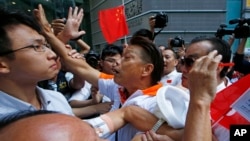Political tensions continued in Hong Kong as pro-democracy legislators vowed to veto Beijing's plan for electoral reform in the city.
Democracy activists said they will canvas Hong Kong over the next several weeks, to educate the population and build support for direct elections of the city's leader.
Emily Lau, head of Hong Kong's Democracy Party, said she and other pro-democratic lawmakers will not allow the electoral reform plan to pass.
“The proposal by the Hong Kong government is not good enough," she said. "It doesn't meet even basic demands of a genuine democratic election. So we are going to vote against it. I think many of the pro-democracy legislators in the legislative council are going to vote against it.”
Last year, pro-democracy activists shut down parts of the city for months in what became known as the “Umbrella Revolution.” Protesters opposed a plan set forth by Beijing that fell short of their desires for a direct election of the city’s leader.
Earlier this year, Hong Kong's government revealed a plan for electoral reform which is almost identical to Beijing's proposed reforms. The plan allows for voting for the city's leader, but from a pool of candidates chosen by a committee backed by loyalists to the Chinese central government.
After the reform plan was revealed, pro-democracy legislators walked out of the city's parliament building, most wearing black tee-shirts with yellow crosses in protest of the government proposal.
Two-thirds of the legislators need to approve the plan for it to pass; and as it stands now, Beijing and the Hong Kong government would have to convince four of the pro-democracy legislators to switch sides for the electoral reforms to become law.
Speaking to reporters, Hong Kong's chief executive C.Y. Leung issued a warning to the city's citizens.
“To initiate any political reform process is not easy," he said. "If this proposal is vetoed, it might be several years before the next opportunity.”
But many Hong Kong citizens, especially the city's youth, say if the reform plan were to pass the legislature, it would be step back for the pro-democracy movement.
“I think the best scenario is that it will be vetoed, to show that the people of Hong Kong will not be cheated by this fake proposal, fake reform,” said Pa Sha, a protester.
The pro-democracy movement has splintered since protests drew hundreds of thousands of demonstrators onto Hong Kong's streets last year. Many students chose to leave Hong Kong's Federation of Students, one of the main organizers of the demonstrations, because of disagreements over the direction the movement.
Some students say they favor more radical action and have staged protests along Hong Kong's border with the mainland, surrounding mainland tourists and shoppers and shouting racist epithets and threats.
But the movement as a whole appears to have broad support among the population.
In a recent poll, fewer than half of Hong Kong residents said they supported the government plan for electoral reform in the city. The proposal was least popular among Hong Kong's well-educated youth. Fifty-five percent of those surveyed with a college education or above were against the proposal, while 63 percent of those between the ages of 18-29 were against it.
Although no mass protests against the proposal are planned, Joseph Cheung a Professor at the City University of Hong Kong, said demonstrations could begin again if pro-democracy legislators switch sides and the reform proposal is passed.
“If some pro-democracy legislators have been pressured to change their position and endorse the political reform bill, it is expected that there will be pretty large-scale protests initiated by the student groups in general,” he said.
Last weekend, a small pro-democracy protest in the Hong Kong neighborhood of Mong Kok resulted in the arrests of eight demonstrators. Television footage showed police using pepper spray and batons to disperse dozens of protesters who were attempting to block traffic.




